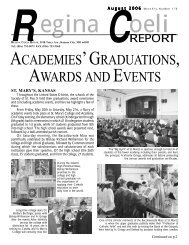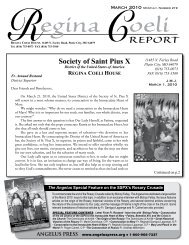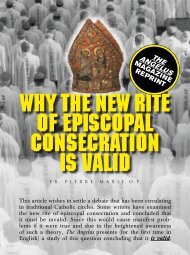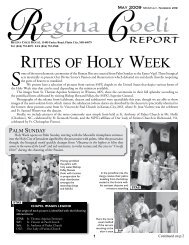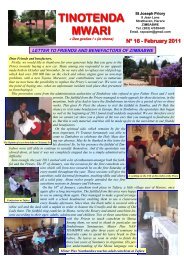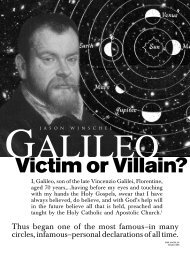Is Feeneyism Catholic? - Society of St. Pius X
Is Feeneyism Catholic? - Society of St. Pius X
Is Feeneyism Catholic? - Society of St. Pius X
You also want an ePaper? Increase the reach of your titles
YUMPU automatically turns print PDFs into web optimized ePapers that Google loves.
T HE TEACHING OF THE CHURCH 51<br />
[Session 7] “Can. 5. If anyone says that baptism is optional,<br />
that is, not necessary for salvation, let him be anathema. Can. 2:<br />
If anyone says that true and natural water is not necessary for<br />
baptism and thus twists into some metaphor the words <strong>of</strong> our<br />
Lord Jesus Christ: ‘unless a man be born again <strong>of</strong> water and the<br />
Holy Ghost’, let him be anathema.” In terms <strong>of</strong> a syllogism we<br />
have the infallible major premise: “Baptism is necessary for salvation,”<br />
the infallible minor premise: “True and natural water is<br />
necessary for Baptism,” and the infallible conclusion: “True and<br />
natural water is necessary for salvation!”<br />
The answer is simple: <strong>of</strong> what kind <strong>of</strong> necessity does the<br />
Council speak in Canon 5? Of the same <strong>of</strong> which the Council <strong>of</strong><br />
Trent itself has spoken in Session 6, Chapter 4, and again in Session<br />
7, Canon 4, i.e., a necessity re aut voto––in deed or in desire.<br />
Their syllogism hence become: baptism is necessary re aut voto for<br />
salvation; now true and natural water is necessary for baptism (it<br />
belongs to its essence); hence true and natural water is necessary re<br />
aut voto for salvation! To say that baptism <strong>of</strong> water is necessary in<br />
fact or in desire is clearly not to say that it is superfluous, nor unnecessary<br />
for salvation!<br />
See later p.98 for a discussion <strong>of</strong> justification versus salvation.<br />
PIUS IX<br />
<strong>Pius</strong> IX is the Pope <strong>of</strong> the Syllabus and <strong>of</strong> the definition <strong>of</strong><br />
papal infallibility. In one <strong>of</strong> his encyclicals from which propositions<br />
<strong>of</strong> the Syllabus were drawn, on August 10, 1863, he wrote:<br />
And here, Beloved Sons and Venerable Brethren, it is necessary<br />
once more to mention and censure the serious error into<br />
which some <strong>Catholic</strong>s have unfortunately fallen. For they are <strong>of</strong><br />
the opinion that men who live in errors, estranged from the true<br />
faith and from <strong>Catholic</strong> unity, can attain eternal life. That is in<br />
direct opposition to <strong>Catholic</strong> teaching. We all know that those<br />
who are afflicted with invincible ignorance with regard to our<br />
holy religion, if they carefully keep the precepts <strong>of</strong> the natural<br />
law that have been written by God in the hearts <strong>of</strong> all men, if<br />
they are prepared to obey God, and if they lead a virtuous and<br />
dutiful life, can attain eternal life by the power <strong>of</strong> divine light<br />
and grace. For God, who reads comprehensively in every detail<br />
the minds and souls, the thoughts and habits <strong>of</strong> all men, will not<br />
permit, in accordance with his infinite goodness and mercy, anyone<br />
who is not guilty <strong>of</strong> a voluntary fault to suffer eternal pun-



